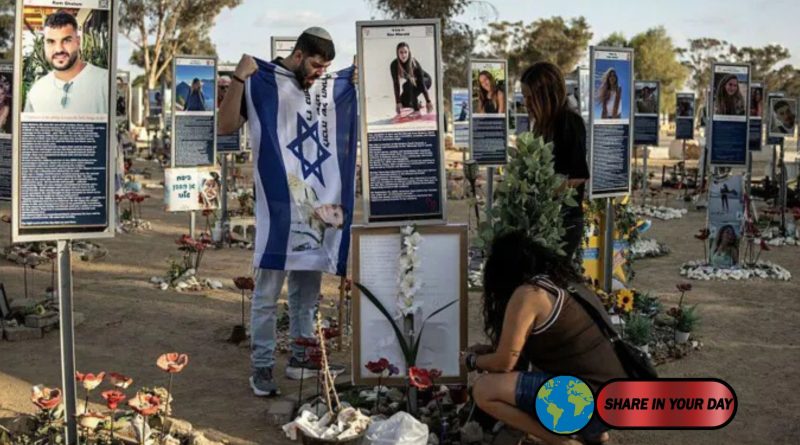Israelis Mark October 7 Anniversary as Gaza Peace Talks Resume
Tel Aviv / Cairo — Across Israel, citizens gathered on Tuesday to mark the second anniversary of Hamas’s deadly October 7, 2023 assault, while in Egypt, negotiators pressed ahead with indirect peace talks aimed at ending the war in Gaza.

That day of violence left more than 1,200 people dead in Israel and saw 251 individuals taken hostage into Gaza—making it the single deadliest day for Jews since the Holocaust.
In response, Israel launched a sweeping military offensive in Gaza that has since resulted in immense destruction and loss of life. Hamas‑run health authorities report over 67,000 Palestinian fatalities—a figure recognized by multiple United Nations and independent agencies.
Commemoration Amid Conflict
Though state ceremonies were officially postponed until October 16 due to Israel’s High Holiday season, many took part in grassroots memorials. In Tel Aviv’s Hostages Square, families and supporters held a televised remembrance.
Moments earlier, a national minute of silence was observed. Meanwhile, at the Nova festival grounds—the scene of one of the deadliest attacks—mourners lit candles and paid tribute to the hundreds of lives lost there.
Prime Minister Benjamin Netanyahu acknowledged the “immense pain” yet framed Israel’s response as one of endurance. He reaffirmed the government’s goals: the safe return of hostages, elimination of Hamas’s regime, and ensuring Gaza no longer poses a threat to Israel.
UN Secretary-General António Guterres recalled the horror of that day, calling it a scar on collective memory. He urged all sides to embrace the U.S.‑proposed peace framework as a chance to end the conflict.

Diplomacy in Egypt: Progress, Tensions, and Stumbling Blocks
In Sharm el‑Sheikh, indirect negotiations between Israel and Hamas entered their second day, mediated by Egypt and backed by U.S. envoys.
Talks have centered on five main pillars: 1) a permanent ceasefire, 2) hostage-for-prisoner exchange, 3) Israeli military withdrawal, 4) humanitarian aid access, and 5) future governance of Gaza.
Still, disagreements remain sharp. Disputes over withdrawal maps and security guarantees have blocked progress. A senior Palestinian source described the sessions as “tough” with “no real breakthrough” yet.
Hamas insists on a full Israeli withdrawal, a permanent ceasefire, and a technocratic governing structure—conditions that Israel has historically rejected.
Meanwhile, U.S. negotiators Steve Witkoff and Jared Kushner were set to join the talks, aiming to break the impasse. President Trump called for urgency, stating the possibility of a “lasting deal.”
Voices from Israel and Gaza
In Israel, bereaved families voiced a mix of grief and resolve. At Hostages Square, and outside Netanyahu’s residence in Jerusalem, citizens demanded both the return of captives and security assurances. Israel officially states 48 hostages remain in Gaza, about 20 believed alive.
One survivor at the Nova festival, 29‑year‑old Hagar, told the BBC:
“No place feels like home anymore … until all the hostages come back none of us will feel safe.”
On the Gaza side, life remains fraught. Airstrikes struck neighborhoods in Gaza City and Shati refugee camp, while hospitals reported bodies arriving even amid resource collapse.
Al‑Shifa and Nasser hospitals processed dozens of fatalities. UNICEF described scenes of mothers and wounded children sharing bare corridors, and premature infants forced to rotate limited oxygen supplies.
Gaza’s health ministry says 25 of 38 hospitals are out of service; the rest operate only partially.
One displaced mother, Emaan al‑Wahidi, spoke through tears about sleeping with her children each night, fearing the next strike.
The Uncertain Road Ahead
Tuesday’s memorials and negotiations highlight how deeply entwined memory, suffering, politics, and diplomacy have become in this conflict. The stakes are enormous:
- For Israel: balancing security imperatives with mounting domestic and international pressure to end the war. Polls show around 70% of Israelis support ceasing hostilities if hostages are freed.
- For Hamas: whether to give up leverage for reconstruction, global recognition, or long-term governance capacity.
- For Gaza: survival in daily life, and whether a ceasefire can meaningfully restore prospects for its people.
If talks collapse, Israel has warned of resuming military operations with renewed intensity. The path to peace is narrow—and every moment of delay invites more pain.




